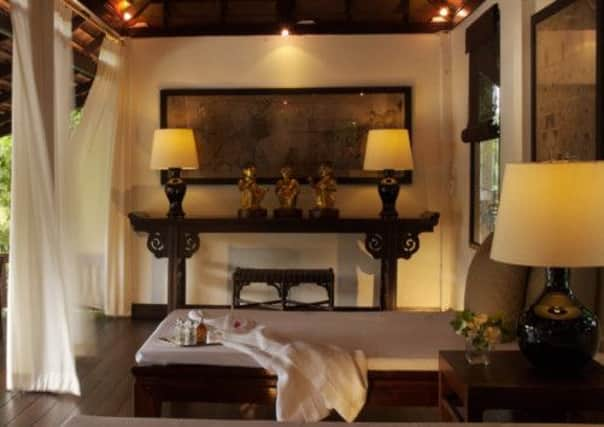Travel: Chiang Mai, Thailand


Monkeys and motorbikes aren’t generally associated with feeling incredibly relaxed and well rested. But they are two of the ingredients of an amazing Thai massage.
Not literally thankfully, though it wouldn’t surprise me given some masseurs’ tendencies towards inflicting more pain than pleasure. The monkey and the motorbike are just handy names for two of the key basic steps involved in a traditional Thai massage. While most tourists visiting Thailand still prefer to receive a massage, growing numbers are learning how to practise the ancient art themselves.
Advertisement
Hide AdAdvertisement
Hide AdIt is day one of a five-day course at the Chetawan Thai Traditional Massage School in the city of Chiang Mai in the north of the country. Over the coming week about half a dozen of us take turns to be models for teachers to demonstrate on, and then to practise on both our teachers and each other. I normally adore receiving massages, but given my painful encounters with marketplace practitioners over the past few days I’m a bit worried. Especially when it occurs to me that the one person more hazardous than a trained Thai masseuse is an untrained one. Too late now though.
Before long we are all covered in numbered black dots which our smiling teachers carefully draw on our feet and legs using marker pens. With dozens of different steps to learn, trainers do this as a memory aid for us pupils on where and when to press. My teacher, Ting, then demonstrates the first stage of the massage, done with the client (me) lying on their back with their legs bent.
Carefully and quietly he presses his thumbs and then palms along the parallel lines of black dots, moving methodically and explaining various things as he goes. “Remember to turn your hands this way here,” he says as he reaches above the knee, moving his thumbs so that they point inwards. “Otherwise is impolite!” Indeed. With Thailand’s reputation for dubious massage services of the “happy finish” variety, schools like Chetawan are keen to stress that they do not do anything of a sexual nature.
At the end of stage one, Ting beams and says “Et voila!” Now it’s my turn to try to repeat the steps on him. The dots definitely help, as does the detailed booklet with picture diagrams of each position. It’s hard to tell if you are pressing on exactly the right line though – get it wrong and you could inflict some serious damage. The monkey is fairly simple – involving linking your hands and sort of kneading the calf or thigh. Mastering the motorbike is harder, sitting in front of your victim as they are lying on their back with one leg outstretched and using your foot to massage their thigh, pushing forward and then up in a series of steps. The class frequently dissolves into giggles as we struggle to get things right. As we improve through the week things become more serious as everyone wants to pass the practical exam on the final day to get their certificate.
Our course coincides with Songkran, the Thai New Year, a national holiday where everyone takes to the streets for a massive water fight spanning several days. It’s fun, and nice to see the monks who follow the original practice of tipping a tiny bowl of water on passers by as a blessing, as opposed to the hordes of tourists and local teenagers driving around firing giant waterguns. A conservative-looking middle-aged Asian lady in a typical conical hat rides through the sodden city on a motorbike with a sidecar carrying blocks of ice which she delivers to dripping revellers, breaking off great chunks with an axe to be dropped into roadside water tubs.
The only way to avoid getting a soaking is to remain indoors, unless you are staying at the elegant Rachamankha hotel.
Here you can safely wander through the cool, colonnaded walkways or sunbathe by the pool in the walled grounds of what is arguably the most luxurious retreat in the heart of the historic city. More a work of art than a hotel, it is part of the global gourmet chain Relais and Châteaux, and its restaurant features dishes from across South East Asia.
Inspired by my massage course I try one of many cookery classes too, joining an evening class at the friendly BaanThai school. The visit to the market to buy ingredients is a wet one, as Songkran is still in full swing, but back at the school things soon heat up with pans sizzling everywhere. My fishcakes don’t look as neat as the teacher’s, but they taste pretty good.
Advertisement
Hide AdAdvertisement
Hide AdBack at Rachamankha I try a massage in the spa, for educational reasons of course. It is pretty good, but although I enjoy it more than previous ones I am still not relaxed, especially when she beats a tattoo on the back of my head and shoulders.
On our final day at Chetawan everyone passes the exam, with the occasional subtle hint from the teacher assessing us. Nevertheless it’s a real sense of achievement, even if the thing I’m most confident of is my ability to inflict pain, deliberately or otherwise.
Return flights to Bangkok from Scottish airports start from around £500 (www.cheapflights.co.uk).
Double rooms at Rachamankha (www.rachamankha.com) cost from about £103 per room plus taxes.
A five-day Thai massage course at Chetawan Thai Traditional Massage School (www.watpomassage.com) costs about £195.
A 3.5-hour evening cookery class at BaanThai Cookery School (www.cookinthai.com) costs around £14 including ingredients, market trip and recipe book.